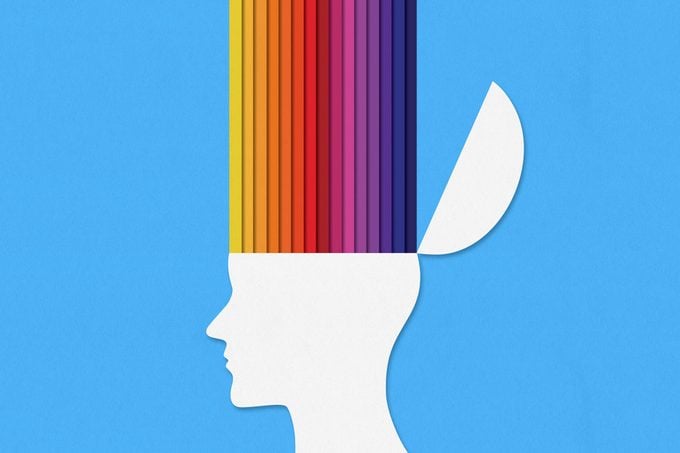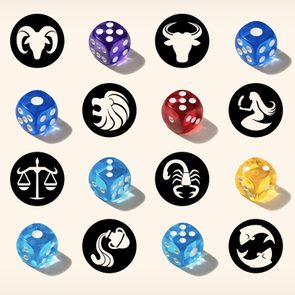Can You Make Your Own Luck? Experts Explain How to Stack the Odds in Your Favor
Updated: Oct. 23, 2023

Feeling lucky? It’s more than a matter of chance. And as luck would have it, we’ve got the tips on how to get good luck.
Luck can really feel random, and it can be tough to know how to get good luck on your side. Some people get in temporary ruts, where things just aren’t going their way. Others may be convinced they can’t catch a break.
While luck is a mysterious roll of the dice that may or may not lead to big winnings in your life, some experts believe luck is not merely a matter of chance. Good luck charms like lucky pennies or four-leaf clovers certainly won’t block your path to good fortune, but experts say there are less mystical ways to consistently find more success.
Get Reader’s Digest’s Read Up newsletter for fun facts, humor, cleaning, travel and tech all week long.
What is luck anyway?
Luck is one of those things that’s hard to put a finger on. It’s more than lucky numbers and good luck plants. “Although luck is often defined as a good or bad outcome caused by chance, the idea of luck is most often used in the context of outcomes that are not completely due to chance, like sports outcomes, work outcomes or financial outcomes,” says educational psychologist and motivation expert Martin Ford, PhD. “Essentially, luck is a force used to explain unexpected successes and failures when the usual explanations do not seem sufficient.”
Can you make your own luck?
Absolutely. And a lot of it has to do with changing your own scenery both mentally and physically and putting yourself in more advantageous situations. “Success comes about from a number of factors,” says Barbara Becker Holstein, a positive psychologist and author of The Enchanted Self: A Positive Therapy.
Experts agree that there are many paths toward better luck, but there is one concept that surely will allow good fortune to find you: “Live a life that allows you to move forward,” says Holstein. And here’s how to do that.
How to get good luck
Ford says that it’s just not true that some people are born lucky. “Luck is not a mysterious superpower,” he says. “People are born with different developmental potentials and vulnerabilities with regard to what naturally motivates them, what kinds of skills are easier or harder to develop, the kinds of environments in which they live and learn and their biological strengths and weaknesses.”
The challenge of making your own luck can be an easier journey for some than others—particularly for those who weren’t born with many biological advantages. But it’s still attainable for everyone. “Success involves four intertwined elements: motivation, knowledge and skills, a responsive environment and sound biological functioning,” says Ford. Here are some specific tips to learn how to get good luck.
1. Adopt a brighter attitude

Experts have long known that a positive outlook can help flip the script on the negative things that are happening in your life. “If you are an optimistic person, you will have enough energy in your mind to notice new things,” says Holstein. And those new things may very well be opportunities. “It’s important to create optimism and hopefulness in our lives, and a lot of times we need some help with that.”
Life doesn’t always leave you in a place of cheerfulness, but when you feel down, Holstein says it helps to recall the times when you felt happiest. Maybe it’s your graduation day, the birth of your child or when you got the starring role in a play. If you still don’t have much hope and joy to draw from, there are actionable ways to develop a positive attitude.
2. Widen your social connections
The more people you know, the more paths you will have to discover new opportunities—and find the good fortune you desire. According to psychologist Richard Wiseman in his classic book The Luck Factor, the No. 1 predictor of how many lucky breaks a person has is how interconnected they are with others. If you’re still feeling the effects of social isolation from the height of the pandemic, it’s time to get back out there and interact with others. On a regular basis too, may we add.
Plus, community is important and friendships are healthy. More human connectivity can help with another basic rule of how to be lucky: optimism. “When you get out of the house and make a new friend or do something nice for someone, you will probably have a better day,” says Holstein.
3. Take risks
You can’t change your luck if you don’t change your approach. Even if you aren’t described by your friends and family as “bold,” that doesn’t mean you can’t be more assertive and take a gamble every now and then. “If you assume you’re not lucky, your mind will take in less opportunity than if you assume you are lucky and hopeful,” says Holstein.
Need ideas on how to take action? If you’re feeling underappreciated at work and aren’t happy about your career prospects, polish your résumé and send it to job listings that interest you. If you’re not meeting the partner of your dreams on dating apps, put yourself in situations where you can meet new people in person. It can feel hard to make a bold move, but the rewards will be well worth it.
4. Stay open-minded

They say that luck favors the bold, but it can also favor those who are willing to consider new ideas. Since luck is an intangible concept, “being open minded and open to new experiences is a helpful mindset,” says Larry Marks, PhD, a licensed psychologist at the University of Central Florida Counseling & Psychological Services. “Desirable events are more likely to happen to those who act on opportunities.”
Have a friend or neighbor who has suggested ideas, such as meditation or manifestation, that you weren’t willing to consider? Being open to new concepts can help put your good-luck train on a new and faster track. But remember: Stay realistic, even in the framework of a more open mindset. “It’s not just about the mindset but the consequent actions that will be beneficial,” says Marks. So keep an open mind, but be aware that hard work is a key part of success too.
5. Put yourself out there
If you want to turn your luck around, it can’t hurt to throw some spaghetti at the wall. There’s not much that’s going to change your perceived unlucky situation if you don’t expose yourself to new opportunities. Let’s use a classic good-luck scenario as an example: “If you want to win the sweepstakes, you have to take one step and enter,” says Marks.
And once you’ve started, find the tenacity to stick with it. “It can be hard to build tenacity, and maybe you can’t do it on your own,” says Holstein. If you’re feeling defeated, she says to grab lunch with a trusted friend or relative who can help give you encouragement to continue down a new path that may boost your odds of success and happiness. Everyone needs a cheerleader or two in their lives.
And if at first you don’t succeed, try and try again. “With outcomes that have a lot of variables, such as making more friends or increasing sales, you may have to take more steps,” says Marks. “And the more steps you take, the more likely things will go your way.”
6. Try new things
If you feel like you’re stuck in a bad-luck rut, it’s time to expand your repertoire of activities. Waking up, going to work and going to bed on rinse-and-repeat isn’t going to change anything about your life, let alone bring more luck your way. Taking up a new hobby may be a great place to start. Not sure how to find a hobby you’ll love? Try something new, something brain-boosting or something that makes you feel productive. Group or team hobbies also are a great way to boost your social network.
Engaging in new activities you enjoy may also give you a big assist in the optimism department: According to a study published in the journal Psychotherapy and Psychosomatics, adult hobbies help make people feel more relaxed, creative and energetic. Doesn’t that read like a tailor-made recipe for better luck?
7. Read something you normally wouldn’t
Want to know how to get good luck? Dive into a book. It’s not a novel concept (maybe that pun was intended), but we’ve all gotten a little too addicted to playing games on our phones and scrolling our social media feeds these days—leaving less time for leisurely reading that can expand your worldview and improve your outlook.
Reading has many benefits, but there’s one we don’t often appreciate enough: It helps relax us. According to research from the University of Sussex in England, reading is the best way to relax, beating out listening to music, having a cup of tea or taking a walk. Tucking your nose in a book for even just six minutes can reduce stress levels by more than two-thirds. Less stress will make it much easier to tackle new situations and opportunities that may help you feel more like a winner than a perpetual loser.
8. Be more generous

Some people may call it karma, but doing kind things for others may help draw better fortune in your direction. And if your bank account or jam-packed schedule doesn’t allow for donations of either your money or your time, there are easier ways to be magnanimous and unselfish. “Even complimenting someone can be an act of generosity,” says Holstein.
A spirit of generosity can also generate more success in your career and your romantic relationships. According to the Greater Good Science Center at UC Berkeley, generosity may help reduce the likelihood of job burnout—which may allow you to feel more engaged with your work and more likely to advance in your position. They also say that generosity is associated with more contentment and longer-lasting romantic relationships.
9. Ask for help
It’s not easy to reach out to others when we’re struggling to get ahead or don’t feel like anything is going our way. But if you stop feeling like you need to do everything on your own, that may be a path to better luck. Seeing a therapist may help you bust out of a negative cycle with your relationships. Finding a career coach could be the ticket to better outcomes with your job. “Don’t be afraid to find a mentor,” says Holstein.
Not sure where to find one? Check in with your workplace. According to the Wharton School of the University of Pennsylvania, 25% of employees in a test group who took part in their company’s mentoring program had a salary bump, compared with 5% of those who didn’t participate in it. Don’t work at a company that offers a mentoring program? Holstein says that many community libraries have free classes and programs that can put you in the room with someone who may be able to give you some solid free advice.
10. Stay focused
According to Ford, the probability of favorable outcomes can be increased by amplifying motivation. If you’re distracted by other things, it can be harder to keep your eyes on the prize. “We may view successful people as lucky, but not see the tremendous amount of work and effort that built their success,” says Marks. So having a singular focus when you’re trying to make some magic happen in your life can go a long way toward achieving the goals that you set for yourself.
Feel like the modern world makes it next to impossible to stay focused? Consider a digital detox. Being more present for the one task that you do at a time can help direct good energy your way.
About the experts
- Martin Ford, PhD, is an educational psychologist and motivation expert at George Mason University in Virginia. His research focuses on motivation and competence development, with an emphasis on the role that personal goals, emotions and personal agency beliefs play in facilitating optimal functioning and life meaning.
- Barbara Becker Holstein is the originator of The Enchanted Self, a positive psychology method for increasing happiness. She is the author of The Enchanted Self: A Positive Therapy.
- Larry Marks, PhD, is a licensed psychologist at the University of Central Florida Counseling & Psychological Services. He has more than 20 years of experience assisting individuals and groups to improve their well-being and achieve their personal goals. He has a private practice that provides counseling and coaching.
Sources:
- Richard Wiseman: The Luck Factor
- Psychotherapy and Psychosomatics: “Fixed-Effects Analyses of Time-Varying Associations between Hobbies and Depression in a Longitudinal Cohort Study: Support for Social Prescribing?”
- The Telegraph: “Reading ‘can help reduce stress'”
- Greater Good Science Center at UC Berkeley: “The Science of Generosity”
- The Wharton School of the University of Pennsylvania: “Workplace Loyalties Change, but the Value of Mentoring Doesn’t”


